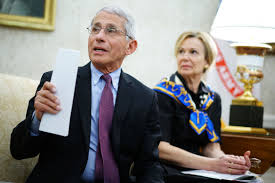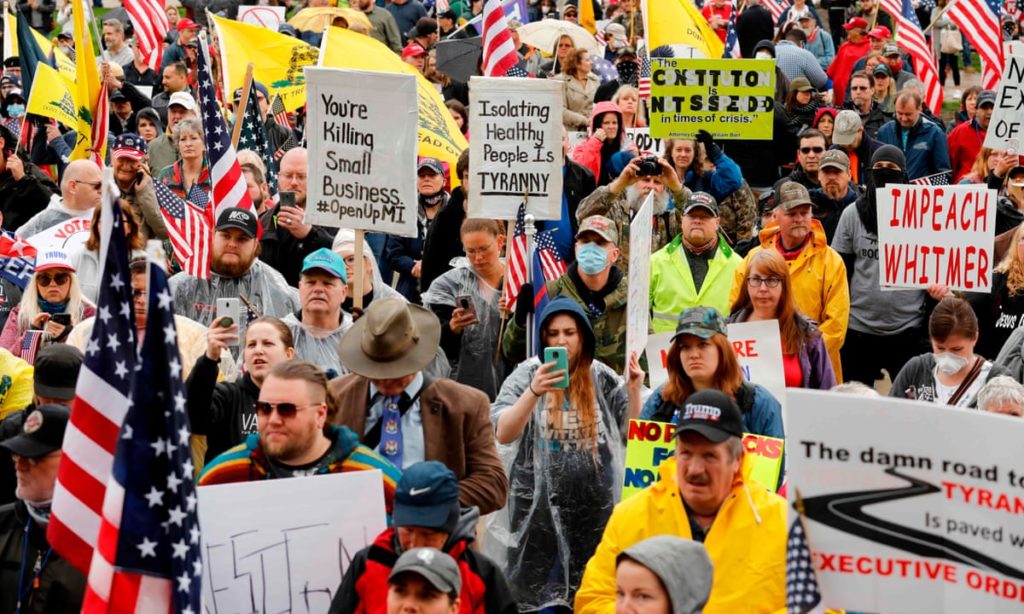Is a Nanny State the “New Normal”?
Fear reflects a lack of resolve, and leads inexorably to submission
A shorter version of this essay first appeared in Law & Liberty on June 17, 2020 as part of a feature entitled Reading Ideas for Your Summer
Vacation (or Staycation) (here).
Ordinarily, summer reading means “books for the beach” or similar entertaining fare. Given the Wuhan virus “crisis” that consumed most of the spring, a bit more reflection is warranted about recent events. I wrote my contribution to the feature while the shut-down was still in effect, and before the George Floyd incident largely superseded the Wuhan hysteria. I fervently hope that the Wuhan shutdown—a nationwide state of house arrest—is a teaching moment. Men are either citizens or subjects. Recent events have treated Americans as panicked, fearful children incapable of making informed decisions regarding their safety, well-being, and livelihoods. If the nation doesn’t recoil from this episode with renewed devotion to freedom, the American experiment is doomed.

Benjamin Franklin famously remarked that “They who can give up essential liberty to obtain a little temporary safety, deserve neither liberty nor safety.” There is, indeed, an inevitable tradeoff between security and freedom. Freedom entails choice—and risk. The price of security is often submission to external control. As the nation hunkered down in response to the Wuhan virus pandemic—and now begins to recover from the cataclysmic effects of the economic shutdown—I pondered what lessons might be learned from the unprecedented events.
As deadly and contagious as the virus has proven to be—claiming over 100,000 lives since arriving in the U.S. just a few months ago—lethal infectious diseases are, unfortunately, not unusual and the death toll of the Wuhan virus pales in comparison to some other outbreaks: smallpox, the bubonic plague, tuberculosis, cholera, malaria, and various strains of influenza. A century ago, the Spanish flu killed many millions of people worldwide. Polio crippled many Americans as recently as 60 years ago. In recent decades, the U.S. has been threatened by serious global epidemics, including the Ebola virus, SARS, swine flu, and the H1N1 virus. An advanced western democracy with such a track record should have been able to deal with the Wuhan virus in a measured way.
Yet, in 2020 a virus that posed a serious threat to a relatively small segment of the population—the elderly and those with underlying health issues—and which was concentrated in certain urban areas, caused widespread panic, in turn prompting an overreaction by governmental authorities at all levels. Americans were shockingly amenable to draconian stay-at-home orders and government-mandated business closures. Nationwide, schools were shut down, college students sent home, millions thrown out of work, churches were shuttered. Drs. Fauci and Birx became the nation’s unelected public health czars, and eagerly assumed the reins of control.

This reaction would have been unimaginable a generation ago. I see drivers wearing masks while alone in the car, or while walking in the park. Many people oppose re-opening the economy until a vaccine is developed—something that could take months (or longer). Extreme “social distancing” and “sheltering in place” used to be regarded as form of mental illness—agoraphobia. Now it is recommended by public health experts. What happened to the freedom-loving patriots who used to inhabit these United States? My reading recommendations were inspired by this question.
Summer is upon us, but it still feels like limbo. As the nation hunkered down in response to the Wuhan virus pandemic—and now begins to recover from the catastrophic effects of the economic shutdown—I ponder what lessons might be learned from these unprecedented events. Nationwide, by government order schools and businesses were closed, college students sent home, millions thrown out of work, churches were shuttered. Congress hurriedly enacted a multi-trillion-dollar stimulus package, as casually as one might order a pizza. Some governors, notably Michigan’s Gretchen Whitmer, asserted sweeping powers reminiscent of martial law. And, by and large, Americans obediently complied, without objection or widespread dissent. Critics were de-platformed, protesters punished.

What happened to the skeptical, independent, freedom-loving patriots who used to inhabit these United States? My reading recommendations were inspired by this question.
Robert Higgs’s 1987 classic, Crisis and Leviathan, argues that beginning with the Progressive movement, big government has grown continuously in response to perceived emergencies—such as wars, labor strife, economic inequality, and high unemployment. Logically, emergency powers should recede to “normal” following the resolution of temporary crises, but this rarely happens. In a ratchet-like fashion, the size and power of government seem to move in only one direction; always more, never less. In times of peace and prosperity, it is easy to dismiss Higgs’s argument as mere cynicism. Sadly, the Wuhan virus “crisis” illustrates the truth of Higgs’s thesis. We are frogs in a pot of heated water, approaching boil. Public health is yet another “emergency” that control-hungry government officials will exploit to expand the power of the state.
What to do? Charles Murray in By the People (2015) calls for a renewal of the “American project,” reclaiming our commitment to limited government and self-reliance. Murray offers a game plan for classical liberals, libertarians, and small-government conservatives–working together—to demand a return to our founding principles. Whether Murray’s bracing—and avowedly subversive–tonic is practicable remains to be seen, but we will never regain our freedom unless we try. The American legal system is a morass. The federal government and the administrative state need to be tamed. The political system is often dysfunctional and corrupt. Entitlements create factions and institutional sclerosis. None of this will be corrected as long as the polity remains supine.
Defending freedom requires courage—confidence in one’s moral convictions. Americans once possessed it in spades. Where did it go? Historian Gertrude Himmelfarb, who passed last year at the age of 97, offers an answer in One Nation, Two Cultures (1999), one of many reflections she wrote on the decline of bourgeois values—traditional morality and other essential virtues—since the 1960s. (Throw in Robert Bork’s Slouching Towards Gomorrah (1996) for an even more pungent assessment.) Self-governing civil societies depend on voluntary association and re-moralized institutions beyond the reach of the omnipotent state.
I will end with the Right’s fierce but happy warrior, Justice Antonin Scalia, taken from us too soon in 2016. Though he is gone, his powerful words live on. Some of his most memorable opinions, and especially his fiery dissents, are collected in an excellent compilation from Regnery, Scalia’s Court, edited by Kevin Ring. Also The Essential Scalia (forthcoming), edited by Jeffrey Sutton and Ed Whelan. Ordinary citizens whose efforts at self-government were stymied by contemptuous lawyers and activist judges had no greater champion than the incomparable Nino.































